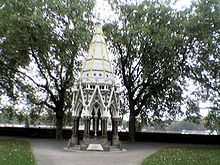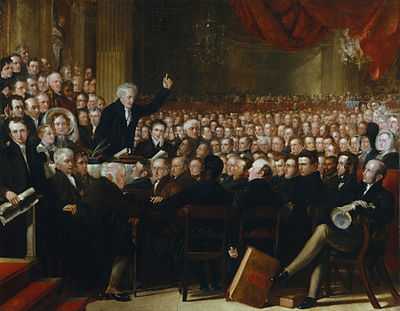Anti-Slavery International
|
| |
| Abbreviation | Anti-Slavery |
|---|---|
| Motto | Today's fight for tomorrow's freedom |
| Purpose | anti-slavery |
| Headquarters | London |
Region served | International |
Director | Dr Aidan McQuade |
| Website |
www |
Anti-Slavery International is an international non-governmental organisation, registered charity[1] and a lobby group, based in the United Kingdom. Founded in 1839, it is the world's oldest international human rights organisation, and the only charity in the United Kingdom to work exclusively against slavery and related abuses.[2]
It owes its origins to the radical element of an older Anti-Slavery Society, known as the "Agency Committee of the Society for the Mitigation and Gradual Abolition of Slavery Throughout the British Dominions", which had substantially achieved abolition of slavery in the British Empire. A successor organisation, British and Foreign Anti-Slavery Society[3] was then created to campaign against the practice of slavery in other countries. In 1990 it was refounded as Anti-Slavery International, which works to combat slavery and related abuse, drawing attention to the continuing problem of slavery worldwide and campaigning for its recognition, abolition and eradication in the countries most affected today.
Overview

The main activities of the organisation are
- lobbying governments of countries with slavery to act against it.
- lobbying governments and international agencies to increase the priority of combating slavery.
- aiding research to find out the extent of slavery.
- working to increase awareness of slavery.
- informing the public that slavery is a real issue today.
Three teams work within Anti-Slavery-International: the Programme, Communication and Information teams. Their goal is a world without slaves.
The Programme team collects relevant information (in cooperation with partners) over central issues, the worst types of child labour, debt bondage, forced labour, forced marriage, human trafficking and traditional slavery. The team publishes the information and promotes legislation to protect victims.
The Communications Team produces material to educate and promote action including the magazine, The Reporter. The team lobby governments, the United Nations and the European Union urging them to help end all slavery. The reference library contains material from early in the abolitionist movement to the present day.
The Information Team deals with administration and fundraising among other issues. They publish an annual review and annual accounts.
History

- ^ Anti-Slavery Society Convention 1840, National Portrait Gallery, London
The first Anti-Slavery Society was founded in 1823 and was committed to the abolition of slavery in the British Empire, which was substantially achieved in 1838 under the terms of the Slavery Abolition Act 1833. In 1839, English activist Joseph Sturge formed a successor organisation, British and Foreign Anti-Slavery Society (today known as Anti-Slavery International), which worked to outlaw slavery in other countries.
In 1840, the World Anti-Slavery Convention was organised in London that attracted delegates from around the world (including from the United States of America, in the South of which slavery was at times referred to as "our peculiar institution") to the Freemasons' Hall, London on 12 June 1840. Many delegates were notable abolitionists, with Thomas Clarkson the key speaker, and the image of the meeting was captured in a remarkable painting that still hangs in the National Portrait Gallery in London.[4]
Modern-day slavery
Underground trade in human beings still exists in the twenty-first century. Regions heavily involved in the trade now include Eastern Europe, West Africa, South America and South Asia.[5] Contemporary slavery comes in various forms, including bonded labour, early and forced marriages, forced labour, slavery by descent, and human trafficking.
Bonded labour often leads to slavery by descent: mimicking the circumstances of indentured servitude (in which, for the cost of medicine or travel, or for some other debt, labour is rendered for a specific period), the underlying loan often is not fully repaid before death, so the obligation to repay it is passed down to a family member. Work may be unrelenting, seven days a week and without break the year round.
Early and forced marriages involve women and girls who are forced into marriages in which they are subjected to harsh labor conditions and suffer physical violence.

Most early modern non-criminal forced labour, before the rise of abolitionist movements in the eighteenth and nineteenth centuries, generally was the lifelong work of slaves from Africa on plantations in the Western hemisphere. Present-day forced labour is less obvious; people are enslaved by governments, powerful individuals, or political parties and forced to work by threats of violence to the slaves or to their loved ones.
Human trafficking is the illegal transportation of kidnapped women, children, and men across international borders in order to put them into slavery at the destination. This form of modern slavery is one of the most common and may affect the most people: it is estimated that between 500,000 and 800,000 victims enter the trade each year.
Current campaigns
Anti-Slavery International is working on a campaign in the Philippines concerning the forced labour and exploitation of domestic workers. In the Philippines the Domestic Workers Bill or Batas Kasambahay, was passed in 1995 to ensure the safety and just treatment of domestic workers. The bill if properly enforced would help to regulate and monitor the treatment of domestic workers. Anti-Slavery International is supporting the government in the Philippines to pass the bill into law and is pushing the government to prioritise this legislation for the safety of its people.
Anti-Slavery Award
| Slavery |
|---|
 |
|
By country or region
|
|
|
Anti-Slavery International instituted the Anti-Slavery Award in 1991 to draw attention to the continuing problem of slavery in the world today and to provide recognition for long-term, courageous campaigning by organisations or individuals in the countries most affected.
- 1991: Bonded Labour Liberation Front (India)
- 1992: Ricardo Rezende
- 1993: End Child Prostitution in Asian Tourism (ECPAT)
- 1994: Edwin Paraison
- 1995: Harry Wu
- 1996: Regional Indigenous Organisation of Atalaya (OIRA)
- 1997: Pureza Lopes Loiola
- 1998: Cheïkh Saad Bouh Kamara
- 1999: Vivek and Vidyullata Pandit
- 2000: George Omona
- 2001: Association for Community Development (ACD)
- 2002: Backward Society Education (BASE)
- 2003: Vera Lesko
- 2004: Timidria
- 2005: Cecilia Flores-Oebanda, (Visayan Forum Foundation)
- 2006: James Aguer Figueira
- 2007: Coalition of Immokalee Workers (CIW)[6]
Significant cases in recent history
On 19 November 2008, the then 10-year-old Nujood Mohammed Ali was honoured for her campaigns against forced early marriage in Yemen.[7] Glamour Magazine named Nujood 'Woman of the Year' for her efforts, shortly after she divorced her own husband of more than 3 years. Nujood herself was the victim of an arranged and forced marriage. Though in Yemen the legal age to marry is 15, the economic conditions prove it more economically convenient to have one less mouth to feed and marry them off as girls. Nujood was married off from her economically struggling family at age nine. The agreement between her father and a local motorcycle courier was that Nujood would marry him with the stipulation that he would not consummate the marriage until she had reached puberty. But like most forced early marriages, Nujood was raped and often beaten. Nujood somehow escaped and proceeded to get the marriage annulled. Her victory in receiving the divorce from her abuse helped to draw attention to the brutality and cruelty children face. Nujood has now returned to school and wants to one day become a lawyer to protect the rights of children.
See also
- Free the Slaves, formed in the U.S. in 2001, was formed as the sister organisation of Anti-Slavery International but subsequently broke links with Anti-Slavery and now there is no relationship between the two organisations.[8]
- Migrant domestic workers
- Supplementary Convention on the Abolition of Slavery
Publications
- Anti-slavery: The Reporter and Aborigines Friend, by Alan Whittaker, Anti-Slavery International. Published by Anti-Slavery International, 1990.
- Children in Bondage: Slaves of the Subcontinent, by Anti-Slavery International, Hope Hay Hewison, Alan Whittaker. Published by Anti-Slavery International, 1991. ISBN 0-900918-27-6.
- Forced Prostitution in Turkey: Women in the Genelevs : a Report, by Anti-Slavery International, Anne-Marie Sharman. Contributor Anti-Slavery International Staff. Published by Anti-Slavery International, 1993. ISBN 0-900918-30-6.
- Britain's Secret Slaves: An Investigation Into the Plight of Overseas Domestic Workers in the United Kingdom, by Bridget Anderson, Anti-Slavery International, Kalayaan (Organisation), Migrant Domestic Workers (Organisation). Published by Anti-Slavery International, 1993. ISBN 0-900918-29-2.
- Slavery in Brazil: A Link in the Chain of Modernisation : the Case of Amazonia, by Alison Sutton, Anti-Slavery International. Published by Anti-Slavery International, 1994. ISBN 0-900918-32-2.
- This Menace of Bonded Labour': Debt Bondage in Pakistan, by Anti-Slavery International. Published by Anti-Slavery International, 1997. ISBN 0-900918-35-7.
- Slavery in Sudan, by Peter Verney, Anti-Slavery International, Sudan Update. Published by Sudan Update, Anti-Slavery International, 1997. ISBN 0-900918-39-X.
- Enslaved Peoples in the 1990s: Indigenous Peoples, Debt Bondage and Human Rights, by Anti-Slavery International, International Work Group for Indigenous Affairs. Published by IWGIA, 1997. ISBN 0-900918-40-3.
- Redefining Prostitution as Sex Work on the International Agenda, by Jo Bindman, Jo Doezema, Anti-Slavery International, Published by Anti-Slavery International, 1997.
- Anti-slavery Reporter, by Anti-Slavery International. Published by The Society, 1998.
- Debt Bondage: Slavery Around the World, by Anti-Slavery International, Canadian Catholic Organization for Development and Peace. Published by Anti-Slavery International ; Development and Peace, 1999. ISBN 2-921936-02-X.
- Human Traffic, Human Rights: Redefining Victim Protection, by Elaine Pearson, Anti-Slavery International. Published by Anti-Slavery International, 2002. ISBN 0-900918-55-1.
- International Action Against Child Labour: Guide to Monitoring and Complaints Procedures, by Pins Brown, Anti-Slavery International, Published by Anti-Slavery International, 2002.
- The Cocoa Industry in West Africa: A History of Exploration, by Anti-Slavery International. Published by Anti-Slavery International, 2004.
- Over 200 Years of Campaigning Against Slavery, by Mike Kaye, Anti-Slavery International. Published by Anti-Slavery International, 2005. ISBN 0-900918-61-6.
References
- ↑ Anti-Slavery International, Registered Charity no. 1049160 at the Charity Commission
- ↑ Anti-Slavery International UNESCO.
- ↑ Sharman, Anne-Marie (1993), ed., Anti-Slavery Reporter vol 13 no 8, London: Anti-Slavery International
- ↑ National Portrait Gallery
- ↑ Kevin Bales (2004). New slavery: a reference handbook. pp. 15–18. ABC-CLIO
- ↑ Awards winners
- ↑ Carla Power, "Ali & Nujood Shada Nasser: The Voices for Children," Glamour, December 2008
- ↑ https://www.freetheslaves.net/SSLPage.aspx?pid=287
- Anti-Slavery International, by Anti-Slavery International, Published by Adam Matthew Publications, 2001.
- "Anti- Slavery: Today's fight for Tomorrow's Freedom." Anti-Slavery International. 09 Sep 2008. Anti-Slavery International. 11 Nov 2008 <http://www.antislavery.org/>.
- "Join The Fight For Freedom 1807-2007." Anti-Slavery International. 01 Aug 2008. Anti-Slavery International. 11 Nov 2008 <http://www.antislavery.org/2007/eventstimetable.htm#jan07>.
External links
| Wikimedia Commons has media related to Anti-Slavery. |